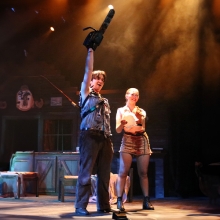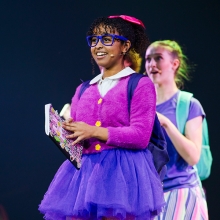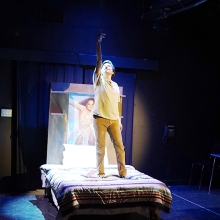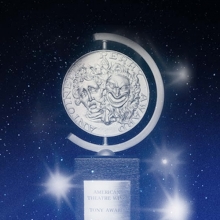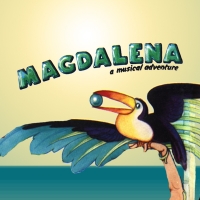
Full Synopsis
Act One
In a Muzo tribe settlement on the outskirts of Puerto Honda in Colombia, South America, is the chapel of Padre José (a Franciscan monk), where stands the shrine of the Miracle Madonna. Nearby, a group of women weaves on a crude native loom and men are pounding and grinding stone bowls of grain. As they go about their afternoon work, Padre José appears from inside of the chapel and walks among the workers ("The Jungle Chapel").
After Padre José leaves, a Peteca (shuttlecock) spins through the air and lands. All of the villagers scream in delight and begin playing a riotous game of badminton-like Peteca ("Peteca"). The rules of this game insist that any girl who misses gets kissed. Sure enough, a girl soon misses the Peteca and is chased by a boy who kisses her in a long embrace. María (Jefa , chief of the Muzo tribe) enters and is dismayed that the people are playing in such a pagan way before the Madonna shrine on a feast day. Padre José returns and María implores the Muzos to gather their simple gifts and go before the Madonna shrine. If they are lucky, perhaps the Lady will forgive them. As the gift bearers present their simple gifts, María helps Manuel (a young Muzo boy) place them about the shrine ("The Seed of God"). The last of the gift bearers are three male Muzos who enter carrying a primitive carving of a bird, a pagan icon. Since this bird is pagan, some are concerned that it should not be given to the Madonna. However, María convinces Padre José that, although the carving is indeed pagan, it is nevertheless considered a good omen at the emerald mines where the Muzos work. That should be enough to consider it worthy to present to the Madonna. Padre José agrees. With this, the villagers all sing and dance in celebration ("The Omen Bird").
After the presentation is finished, Padre José talks with María and tells her that there is a much "tougher bird" that he's after – Pedro. Pedro is a member of the tribe who stays away from the chapel, and Padre José wishes to convert him and get him to come to the church. Padre José, however, is heading downriver tomorrow for the missions and will be gone for a few weeks. While he is gone, he is leaving all of the affairs in María's hands, confident that she will take care of everything and look after the precious Madonna in the shrine. It is clear that the Muzos have recently been converted to Catholicism.
There is a distant sound of an auto horn and cheers that indicate that Pedro is approaching. Steering his sputtering bus, Pedro drives into the village and receives quite a reception. The bus passengers, however, all leap from the bus and fall to their knees before the Madonna shrine, giving thanks that their lives have been spared. Pedro jumps down and greets the adoring villagers. Although his bus may be old, he sees it as the best one in the whole wide world ("My Bus and I"). The passengers who have been praying berate both Pedro and the bus, but Pedro continues to praise himself and his bus.
Pedro finally leaves with the children just as María and Padre José return to meet Major-Doctor Blanco (an army doctor). Blanco is concerned that the Muzos have quit work in the emerald mines and he knows that General Carabana (the wealthy mine- and landowner, living in Paris) will be upset when he learns that the work has not been finished. Muzo tribe chief, María, is concerned that the General's foremen cheat her people and thinks that the Muzos shouldn't work under such conditions. Pedro returns from playing with the children and supports María's views. To him, Carabana is nothing more than a thief who has stolen their land and has made slaves of the Muzos. María doesn't want Pedro to speak for her, but he continues to interrupt every chance that he has. The people wish to work as long as they are treated well. They wish for love and not hatred between them all and, until this exists, the people will work no more.
Blanco realizes that this problem is getting far too complicated, so he decides to fetch Carabana from Paris. María believes that love will solve all of their problems; Pedro sees this as ridiculous. He reminds her that Carabana is a selfish and evil man who will respond to no one. Why waste "love" on a man like Carabana? To María, love is never wasted. Pedro attempts to embrace her, but she pulls away. He wants to go back to a time when they both laughed and smiled at each other and he asks Maria to remember those times. He takes out a large emerald wrapped in a white cloth and holds it out. He asks her to remember when they searched the mine of the old kings and found it; it grew to represent something quite special between them. Together, they remember a time when they were in love ("The Emerald").
Two weeks later in Paris, at the Little Black Mouse Café, an old-world temple of high living and low thinking, General Carabana, a fat bon vivant in complete uniform, is seated. He observes French life and the celebrations occurring all around him ("The Civilized People"). He tastes premium champagnes, dances with a bounty of beautiful girls and enjoys crepes specially prepared for him by Teresa, the proud but temperamental cook of the Little Black Mouse ("Food for Thought") The General loves his food and is so taken in by Teresa's crepes that, in appreciation, he gives her an emerald from one of his Colombian mines.
Blanco enters in a magnificent Colombian military uniform and informs the Carabana that the Muzos have stopped working in the Colombian emerald mines. If work doesn't resume, Carabana will soon be bankrupt. It is essential that he return to Colombia as soon as possible. The General prepares to go and asks his lover, Teresa, to come along., She, however, has no interest in going to the jungle to live among the monkeys and savages. Carabana does not want to go without her (mostly because he loves good cooking) and implores Zoggie, a phony astrologer (complete with beard, turban and crystal ball), to convince her. Using his "magic" powers, Zoggie looks into his crystal ball and sees that the stars spell out "COLOMBIA," the gem of the Andes, the emerald of South America ("Come to Colombia"). Even after hearing this, she hesitates, but, when Carabana promises to give her an array of emeralds for a beautiful necklace, she suddenly decides that she has no reason to defy the Zodiac ("Plan It by the Planets"). Although Teresa is about to make this journey, she has not been away from Paris since she was sixteen and she will miss this city she loves so much ("Bon Soir, Paris"). She wishes Paris well as she prepares to travel with Blanco and Carabana ("Travel, Travel, Travel").
Ten days later, it is a hot and sultry afternoon on the boat landing at Puerto Honda on the Magdalena (the Colombian river that flows from the mountain to the sea). Nearby is a ramshackle hotel with a number of Muzos languidly fanning themselves and trimming the veranda blossoms. Together, they sing about the river and all of its treasures ("Magdalena"). Pedro appears and is ready to have some fun. He slips a coin in a Pianola, and it starts to operate falteringly until it finally plays full force. Hearing this, the Muzos all begin to dance excitedly until the Pianolita breaks down completely with a loud discord ("The Broken Pianolita").
Suddenly, there is the sound of a boat whistle, and all of the Muzos look at the approaching boat. It appears that General Carabana is arriving, and María has ordered everyone to "love" the general, despite the objections of some. Blanco runs down the ramp and orders all of the Muzos to greet General Carabana, but, without their chief, María, to spur them on, only one old man greets Carabana. The General doesn't appear too happy with this greeting. Teresa, followed by Zoggie, comes down the ramp and is even less impressed by what she sees... and especially by what she smells. She wants to go home and all but orders the boat to turn around and take her back. Blanco tries to assure her that Carabana's hacienda will be far more beautiful and comfortable than this boat landing.
Pedro enters from the nearby hotel and swaggers down the steps. Teresa sees him, catches her breath and then smiles, making her interest quite clear. He talks with her and offers her a ride in his bus. Not knowing what she is getting into, she goes off to prepare for her ride. While Teresa is primping, Pedro and Carabana have a chance to meet. Pedro wastes no time in insulting the arrogant General, but Pedro leaves before things get too out of hand. María enters and greets Carabana, offering to make peace with him. It appears that her people will even go back to work if he meets with some of their demands. She offers to show Carabana the shrine that they have built to the Virgin. Carabana kisses her warmly and with gratitude. A jealous Pedro sees this and is just about to break them up when Teresa comes galloping out of the hotel. She has changed and is ready for a ride with Pedro.
Teresa and María have a rather awkward meeting, and Pedro does not help matters. María has arranged a fiesta to greet Carabana, but Pedro wants no part of it. In fact, he's ready to fix his own "fiesta" for Carabana... and he adds that there won't be any kissing in it. Pedro strides off in anger. María signals the start of the festival, beginning with the children who greet the General and Teresa, offering them flowers and gifts ("Greeting").
Folowing the lead of the children, everyone assumes his or her ceremonial positions. The procession enters and fills the area. It is climaxed by the appearance of the Madonna ("The River Song"). Suddenly, there is a great clatter of horn blowing and banging, and Pedro drives on with a bus that is crowded with drunken peasants who pile off and dance wildly. Pedro urges everyone to continue in this debauchery as he laughs and enjoys it all. María, desperate to stop this fiasco, takes out a whip and furiously whips the dancers into submission. In her frenzy, María confronts Pedro and strikes him. Instead of backing away, Pedro asks to be whipped harder and finally forcibly kisses María. She breaks free and runs back to the Madonna, kneeling before her in contrition.
Pedro is further angered by the fact that the Madonna has robbed the Muzos of their courage and has reduced María into acting as she does. He talks with some of the tribe members and makes them agree that, in order to save the Muzos, they must take the Madonna away and break the "bad magic." The men agree and conspire to meet Pedro that evening at the shrine.
Teresa emerges from the hotel and scolds Pedro for causing the General to have a stomachache. In the course of this, Teresa reveals to Pedro that Carabana and María are going to meet at the Madonna shrine tonight to discuss the working conditions. Pedro is ready to take care of Carabana, but Teresa implores him to use finesse.
Later that evening at the Shrine of the Madonna, María enters and sees Pedro, who apologizes for spoiling the fiesta. She tells him that she was expecting General Carabana. Pedro informs her that Carabana told Pedro to drive him straight to his hacienda, so he probably won't be coming tonight. Hoping that he will come tomorrow, María prepares to leave, but Pedro distracts her by kissing her passionately ("The Forbidden Orchid"). María resists him, but he persists in seducing her in an attempt to distract her attention from the shrine. She finally gives in and he carries her off into the jungle.
The men appear and, although they are conflicted about stealing the Madonna, they take the statue and triumphantly run into the jungle. With no one there to watch it, the shrine stands alone and desolate.
Act Two
In a jungle clearing around a great moro tree, a primitive and exotic ceremony is happening ("The Singing Tree"). Upon completion of the ceremony, Muzo couples are kissing and embracing when Pedro bursts in with María and announces that the two of them are soon to be married. María confirms this, saying that the two will wed in the chapel upon Padre José's return. Everyone appears to be excited for the couple until Manuel suddenly rushes in and announces that the Madonna has been stolen. Everyone rushes off to look for the statue while María and Pedro are left alone. It is then that she realizes that Pedro tricked her the night before when he carried her away from the chapel. He does not deny these accusations. María begs him to return the statute, but he refuses. She falls to her knees and begs forgiveness from the Virgin. Pedro calmly tells her that he will keep the statue until all of the labor disputes are settled with Carabana. He has no intention of returning it until that time.
The men return and announce that the statue is definitely gone and that they are prepared to kill the man who stole it, but María orders that they let the man live. She then publicly calls off her wedding and goes off to find General Carabana in hopes of settling the dispute about the mines.
Simultaneously, Major-Doctor Blanco enters with an official-looking scroll, which he reads to the people. Carabana has ordered that, until the trouble in the emerald mine is settled, the Muzos are forbidden to congregate in groups larger than twelve. Failure to obey will be considered insurrection and the ringleaders will be banished. After Blanco leaves, Pedro rallies all of the Muzos together to go to Carabana's hacienda and ask for the emerald mines back. If he refuses, he thinks that they should pull his house "down round his ears." The other Muzos agree with Pedro and begin to rally in support ("Freedom!").
That afternoon, in a corner of the kitchen of Carabana's hacienda, Teresa, helped by a few Muzos, is preparing a glorious French banquet ("Teresa Cooks"). She is distracted by Juan, who gets her to leave and survey the wines while Pedro enters the kitchen to inform everyone that his troops are going to confront the General. Pedro talks with the returning Teresa and tries to convince her that soon Carabana will be defeated. He also tries to convince her that Carabana has no interest in her and will send her back to Paris alone, adding that he is flirting with María while they speak. Carabana suddenly bursts into the kitchen as Pedro leaves. The General tries sampling the food, but Teresa raps his knuckles with a spoon, demanding to know what he is doing with María upstairs. He tells Teresa that he and María are only discussing politics, but she doesn't believe it, claiming that he is attempting to make love to her in hopes of getting the Muzos back to work. An enraged Teresa kicks him out of the kitchen (and the bedroom, for that matter), yelling that María can now do it all for him.
Carabana is most distressed because, with this, comes the end of tonight's banquet and all of the other meals that he loves so much. Teresa's food means so much to him that he relents and agrees to send María away. Teresa agrees to prepare for the banquet but she needs soothing. She wants the Carabana family emerald necklace, complete with one hundred emeralds! He agrees to get her the necklace, and she agrees to continue to cook.
That evening, Carabana's hacienda is full of people celebrating at the banquet ("A Spanish Waltz"). After a dance has finished, Teresa announces the dinner, and the guests prepare to be seated. Doctor Blanco tells Carabana that he shouldn't eat the meal. He checked his blood pressure and found it to be alarmingly high and suggests that the General eat nothing but milquetoast. An alarmed Teresa goes to get the milquetoast, but, as soon as she leaves, Blanco tells Carabana that he is actually more concerned about the General's hacienda and emerald mines at this moment. He knows that the Muzos are ready to revolt. He proposes as a solution that Carabana marry María. This "alliance of state" would stop an insurrection. This makes Carabana even more concerned because he promised Teresa that he would never see María again. Blanco convinces the General to sign a prenuptial agreement or fall victim to an imminent barbaric attack. Even though this agreement will give María half-control over all property, Carabana reluctantly agrees and signs the papers.
María enters to speak with Carabana, and he shows her the signed agreement. She is confused by what she sees and by his attempts to woo her. Before he gets very far, a fusillade of shots are heard ("Revolt at the Hacienda"). The insurrection has started! Pedro and the others soon enter with guns. María tries to stop them, claiming that, if they hurt Carabana, they hurt her as well. A disgusted Pedro throws their special emerald at María's feet and leads the men away.
María reluctantly signs the papers, and the General offers her the family necklace that he has promised to Teresa. She doesn't accept it but, rather, quickly goes to join the other Muzos. Teresa has returned with the milquetoast, having overheard the former conversation. She sings a devilish siren song ("Piece de Resistance") and leaves with the emerald necklace that was promised her.
Alone, Carabana and Blanco discuss getting rid of Pedro. They plan on putting dynamite on his bus, setting it to explode when he reaches the highest point on the cliff while driving away. Blanco leaves to attend to all of this when Teresa returns to discuss all that she has overheard. Her manner is changed – although she is still sophisticated and caring – underneath, there is something icy, even sinister at work. Carabana tries to reason with her, saying that he would have been killed had he not signed the agreement. She agrees with him and even offers to bring him food. In fact, she orders some servants to lay out the prepared feast, and they do ("Piece de Resistance"). Carabana eats ravenously, and Teresa encourages him until he suddenly has an attack from overeating. As he collapses, Teresa hurries to him and tries to take the necklace from his pocket, but, before she can succeed, he revives. She draws back and orders more food, which he gorges until he finally suffers another attack. This time, Teresa gets the necklace and triumphantly sweeps off as the sound of the exploding bus is heard in the distance.
A few hours later at the shrine, it is early morning and Padre José (who has just returned from his journey downriver) is discussing with María and the others all that has transpired in his absence. The Madonna is lost. The General is dead. Pedro's bus lies at the bottom of the cliff. The Muzos feel as if they are accursed. Padre José tries to convince them that, even though bad things have happened, they aren't a cursed people.
The Muzos go and pray in the chapel while María, left alone, takes out the emerald and gazes at it ("The Emerald Again"). Pedro appears, bruised and battered. Yes, María's prayers to the Madonna were answered. She asks Pedro to return the statue, but he has no intention of doing so. He wants María and the rest of the people to return to the ancient tribal ways. María cannot accept this and she leaves him there, alone. He looks to the empty shrine and bows very slowly, conveying "You win!" He then leaves determinedly.
The sound of the Muzos' singing is heard coming from the shrine. María enters and takes her place sings with the others ("The Seed of God"). Padre José addresses the people and the empty shrine. Pedro appears and, in his arms, brings his gift: the Madonna. All react joyously. Padre José actually got his "tough little bird" by converting Pedro. María stands, transfixed, as Pedro returns the Lady to her shrine; then she goes to his side. With the Miracle Madonna safe in her shrine, María in Pedro's arms, and Padre José reunited with his little flock, the jungle chapel resounds with ringing bells and joyous voices.
Show History
Inspiration
Magdalena's title is often mistakenly assumed to be a reference to Mary Magdalene. In fact, the musical takes its name from a river in Colombia. Heitor Villa-Lobos' score, which he orchestrated himself, combines South American folk themes with a soaring Ravelian impressionism that has the lushness of movie music.
According to a New York Times article from 1987, 'the idea was to construct the most expensive scenery ever built for Broadway, Mr. Wright recalled. "Because Song of Norway [another show that Forrest and Wright had written] had made a fortune for everyone who had put money into it, there was no limit to what could be done."
Productions
Edwin Lester, president of the Los Angeles Civic Light Opera, commissioned Magdalena, and the show opened at Civic Light Opera on July 26, 1948. Arthur Kay conducted a cast that included Irra Petina, Dorothy Sarnoff, John Raitt, Hugo Haas, Gerhard Pechner, A. Garcia, Melva Niles, Henry Reese, Ferdinand Hilt, J. Arthur, Betty Huff, Christine Matsios, Leonard Morganthaler, John Schickling, Lorraine Miller, Gene Curtsinger, Patrick Kirk, Betty Brusher and Jack Cole. Jules Dassin directed, Jack Cole was the choreographer and the chorus was prepared by Robert Zeller. Broadway veterans, Howard Bay (settings and lighting) and Irene Sharaff (costumes), were also part of the creative team.
The show then opened at the Curan Theatre (San Francisco Light Opera) for several performances, beginning August 16, 1948.
The San Francisco production of Magdalena then moved to Broadway, where it opened at the Ziegfeld Theater on September 20, 1948. This production also featured staging by Jules Dassin and choreography by Jack Cole. Actors, John Raitt, Dorothy Sarnoff and Hugo Haas returned for this production, as well. The show ran for 88 performances and closed on December 4, 1948.
After Broadway, Magdalena was not performed for nearly forty years. It was only with its concert revival (November 24, 1987, at the Alice Tully Hall in Lincoln Center) that performance rights once again became available.
More recent productions have occurred in Australia and Paris in the 1990s and early 2000s.
Cultural Influence
- A symphonic suite of seven songs from the score of Magdalena, arranged by Andre Kostelanetz, is also available for rental.
- The score for Magdalena is by Brazilian musical giant, Heitor Villa-Lobos. Villa-Lobos was a Brazilian composer, described as "the single most significant creative figure in 20th-century Brazilian art music." His music was influenced by both Brazilian folk music and by stylistic elements from the European classical tradition.
- A recording of the score was made in RCA's studios in 1998 and issued by CBS (later Sony) in 1989. The cast of the recording differed slightly from the original concert cast, and included Judy Kaye, George Rose, Faith Esham, Kevin Gray and Jerry Hadley.
Trivia
- The Broadway production of Magdalena cost somewhere between $250,000 and $300,000. That made it the most expensive show ever produced up to that time.
- There was an initial misunderstanding between composer, Villa-Lobos, and lyricists, Forrest and Wright. Villa-Lobos didn t understand that, when he signed his contract, he would not be writing an original score for the piece. When he discovered this reality, he went to the lyricists in tears, and they decided that they should write the score together.
Critical Reaction
"A superlative score... pulsating rhythms and contrapuntal melodies."
– Associated Press
"A flaming, opulent, disturbing and imaginative work."
– Daily News
Connect
Billing
- Book by
- Music by
- Lyrics by
- Reconstructed and Adapted by
Requirements
|
Music by
HEITOR VILLA-LOBOS
|
Book by
FREDERICK HAZLITT BRENNAN and HOMER CURRAN
|
Video Warning
In accordance with the Performance License, you MUST include the following warning in all programs and in a pre-show announcement:ANY VIDEO AND/OR AUDIO RECORDING OF THIS PRODUCTION IS STRICTLY PROHIBITED.
Included Materials
| Item | Quantity Included |
|---|---|
| LIBRETTO | 25 |
| PIANO VOCAL SCORE | 25 |
Production Resources
| Resource |
|---|
| HOW DOES THE SHOW GO ON-10/CS |
| HOW DOES THE SHOW GO ON? |
| REFERENCE RECORDING |
STANDARD ORCHESTRATION
| Instrumentation | Doubling |
|---|---|
| BASS | |
| CELLO | |
| HARP | |
| HORN | |
| PERCUSSION | |
| PERCUSSION 2 | |
| PIANO | |
| REED 1 | FLUTE , PICCOLO |
| REED 2 | CLARINET |
| REED 3 | ALTO CLARINET |
| REED 4 | BASSOON |
| REED 5 | OBOE |
| TROMBONE | |
| TROMBONE 2 | |
| TRUMPET | |
| TUBA | |
| VIOLA | |
| VIOLIN | |
| VIOLIN 2 |
